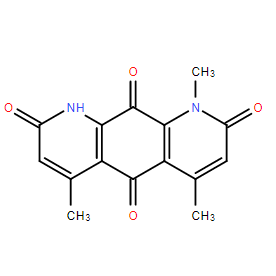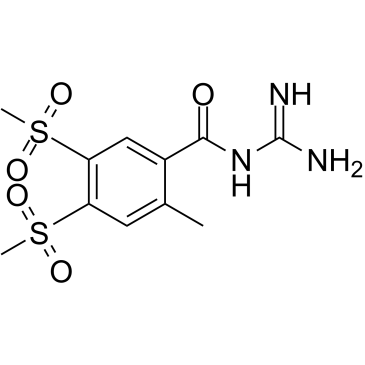 To enhance service speed and avoid tariff delays, we've opened a US warehouse. All US orders ship directly from our US facility.
To enhance service speed and avoid tariff delays, we've opened a US warehouse. All US orders ship directly from our US facility.
| Cat. No. | Product Name | Field of Application | Chemical Structure |
|---|---|---|---|
| DC23149 | Oseltamivir acid |
Oseltamivir acid (GS 4071, Ro 64-0802, Oseltamivir carboxylate) is a potent inhibitor of influenza neuraminidase (NA) with Ki of <1 nM for both A and B strains,showed potent activity against COVID-19(SARS-COV-2).
More description
|

|
| DC21402 | Deoxynyboquinone |
Deoxynyboquinone, also known as DNQ, is a potent inducer of cancer cell death. DNQ potently induces death of cancer cells in culture, with IC(50) values between 16 and 210 nM. In addition, unlike the experimental therapeutic elesclomol, DNQ is still able to induce cancer cell death under hypoxic conditions. This mechanistic understanding of DNQ will allow for a more comprehensive evaluation of the potential of direct ROS generation as an anticancer strategy, and DNQ itself has potential as a novel anticancer agent.
More description
|

|
| DC22089 | Rimeporide (EMD-87580) |
Rimeporide (EMD87580) is a potent, selective sodium hydrogen exchanger NHE1 inhibitor, show promise as potential therapeutic agents for the treatment of heart failure..
More description
|

|
| DC37141 | 4-Acetylaniline |
4-Acetylaniline is a biochemical.
More description
|

|
| DC34413 | Arg-Gly-Asp |
Arg-Gly-Asp is a primary sequence in cellular recognition. It is involved with the binding of proteins to cell surfaces and has strong affinity and selectivity to the alpha(V)beta(3) integrin receptors.
More description
|

|
| DC37806 | L-Saccharopine |
L-Saccharopine is a product of breakdown of essential amino acid Lysine. Saccharopine is also part of the α-aminoadipate pathway of fungal lysine biosynthesis.
More description
|

|
| DC37850 | Tetralysine |
Tetralysine is a cationic moietie that may be used in the construction of gene delivery vectors and DNA nanoparticles.
More description
|

|
| DC36455 | 24-norUrsodeoxycholic acid |
Norucholic acid is a Ursodeoxycholic Acid (U850000) derivative. It is superior to Ursodeoxycholic acid in the treatment of sclerosing cholangitis in Mdr2 (Abcb4) knockout mice.
More description
|

|
| DC34623 | DBHDA |
DBHDA is a reagent to convert a Cys into a Dha moiety by reacting with a C-terminal Cys residue and thus allowing the use of recombinant Ubl G76C mutants to prepare probes.
More description
|

|
| DC34137 | Adrenalone |
Adrenalone is an adrenergic agonist used as a topical vasoconstrictor and hemostatic.
More description
|

|
| DC36094 | Aztreonam E-isomer |
SQ-28429 is a synthetic monobactam.
More description
|

|
| DC36550 | Dicloran |
Dicloran is a biochemical.
More description
|

|
| DC36802 | Lymecycline |
Lymecycline is a semisynthetic antibiotic related to TETRACYCLINE.
More description
|

|
| DC34058 | 15-Hexadecynoic acid |
15-Hexadecynoic acid, also known as Alkynyl Palmitic Acid, is a chemical probe for SCRIB palmitoylation and palmitoyl acyltransferases (PATs). This biochemical can be used to identify and characterize the post-translational S-palmitoylation of proteins with Click Chemistry.
More description
|

|
| DC36492 | Anpirtoline hydrochloride |
Anpirtoline HCl is highly potent 5-HT1B receptor agonist which decreases central serotonin synthesis and attenuates aggressive behavior in vivo. Anpirtoline HCl also acts as an antagonist at 5-HT3 receptors and is brain penetrant. Anpirtoline is a receptor agonist with antinociceptive/antidepressant-like actions in rodents.
More description
|

|
| DC33813 | Citrazinic acid |
Citrazinic acid inhibits 3-dehydroquinate dehydratase from Mycobacterium tuberculosis.
More description
|

|
| DC34127 | Rhodamine 6G |
Rhodamine 6G is a Rhodamine analog used in Pgp efflux assays and characterizing the kinetics of MRP1-mediated efflux. It is also utilized as a laser dye and potential mitochondrial probe.
More description
|

|
| DC35632 | L- Homopropargylglycine (HPG) HCl |
L- Homopropargylglycine (HPG) HCl salt is an amino acid analog of methionine containing a very small modification. The alkyne moiety can be fed to cultured cells and incorporated into proteins during protein synthesis. The alkyne-modified protein is detected with either fluorescent azide or biotin azide.
More description
|

|
| DC33759 | Acetophenone |
Acetophenone is used for fragrance in soaps and perfumes, as a flavoring agent in foods, and as a solvent for plastics and resins. It is also a flavouring ingredient used in fruit flavours.
More description
|

|
| DC33816 | Benzeneboronic acid |
Benzeneboronic acid is a boronic acid that is used in Mizoroki-Heck and Suzuki-Miyaura coupling reactions.
More description
|

|
| DC37723 | Pidolic acid |
Pidolic acid is a cyclized derivative of L-GLUTAMIC ACID. Elevated blood levels may be associated with problems of GLUTAMINE or GLUTATHIONE metabolism.
More description
|

|
| DC36748 | Benoxacor |
Benoxacor is an inert agricultural chemical that acts as an herbicide safener to protect crops from herbicide toxicity.
More description
|

|
| DC36261 | Cerebroside C |
Cerebroside C is a fungal metabolite and glycosphingolipid that induces production of the phytoalexin momilactone A when applied to wounded rice leaves, indicating that cerebroside C is an elicitor of the hypersensitive response in rice. Cerebroside C increases germination rate and reduces germination time in wheat seeds in a concentration-dependent manner at 4°C. It also increases root length, fresh weight, and dry weight of wheat seedlings when used at a concentration of 20 μg/ml at 4°C, indicating increased chilling tolerance.
More description
|

|
| DC37111 | 4-Chlorobenzenesulfonamide |
4-Chlorobenzenesulfonamide is a sulfonamide derivative.
More description
|

|
| DC34992 | Bis-aminooxy-PEG4 |
Bis-aminooxy-PEG4 is a PEG derivative containing two aminooxy groups. The hydrophilic PEG spacer increases solubility in aqueous media. The aminooxy groups can be used in bioconjugation. It reacts with an aldehyde to form an oxime bond. If a reductant is used, it will form a hydroxylamine linkage.
More description
|

|
| DC34990 | Bis-aminooxy-PEG2 |
Bis-aminooxy-PEG2 is a PEG derivative containing two aminooxy groups. The aminooxy groups can be used in bioconjugation. It reacts with an aldehyde to form an oxime bond. If a reductant is used, it will form a hydroxylamine linkage.
More description
|

|
| DC34991 | Bis-aminooxy-PEG3 |
Bis-aminooxy-PEG3 is a PEG derivative containing two aminooxy groups. The aminooxy groups can be used in bioconjugation. It reacts with an aldehyde to form an oxime bond. If a reductant is used, it will form a hydroxylamine linkage. PEG Linkers may be useful in the development of antibody drug conjugates.
More description
|

|
| DC34994 | 1,3-Bis-aminooxy propane |
1,3-Bis-aminooxy propane is an Aminooxy PEG Linker. Aminooxy-PEG can be used in bioconjugation. It reacts with an aldehyde to form an oxime bond. If a reductant is used, it will form a hydroxylamine linkage.
More description
|

|
| DC35039 | Benzyl-PEG3-Tos |
Benzyl-PEG3-Tos is a Benzyl PEG Linker. PEG Linkers may be useful in the development of antibody drug conjugates.
More description
|

|
| DC37087 | p-tert-Butylphenol |
p- tert- Butylphenol is a chemical compound from the group of phenols .
More description
|

|